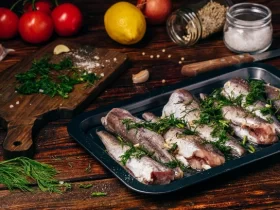How To Cook Eggs Without Sticking: Easy Tips and Tricks
Nothing ruins the joy of cooking eggs more than when they stick to the pan. But fear not! We have some easy tips and tricks that will help you cook eggs without any pesky sticking. Whether you prefer sunny-side up, scrambled, or poached eggs, these methods will ensure a perfectly cooked, non-sticky breakfast every time. Let’s dive in!
1. Choose a Non-Stick Pan
A non-stick pan is a game-changer when it comes to cooking eggs. Invest in a high-quality non-stick pan to prevent sticking and make your cooking experience a breeze. The smooth surface of the pan reduces the chances of the eggs clinging to the surface and ensures easy flipping and removal.
2. Heat the Pan Correctly
Before adding the eggs, make sure to preheat the pan properly. Heating the pan over medium heat for a couple of minutes will create an even, non-stick surface. Avoid using high heat as it can cause the eggs to stick and cook unevenly.
3. Use Enough Fat
To further reduce the chances of sticking, add a small amount of cooking fat to the pan. Options like butter, olive oil, or cooking spray work great. The thin layer of fat will create a barrier between the eggs and the pan, preventing them from sticking.
4. Crack the Eggs Gently
When cracking the eggs into the pan, do it gently to avoid breaking the yolks. Slowly crack the eggshell on a flat surface and carefully open it over the pan. This technique minimizes the risk of shell fragments ending up in your eggs and ensures a clean, non-sticky cooking process.
5. Use a Spatula or Wooden Spoon
When cooking your eggs, use a spatula or wooden spoon to gently stir or flip them. These tools are less likely to scratch the non-stick surface of the pan, keeping it intact and preventing any sticking. Be patient and avoid rushing the process.
6. Opt for Low and Slow Cooking
Patience is the key to perfectly cooked eggs. Cooking them over low to medium heat slows down the cooking process, giving you more control and preventing any sticking. Take your time and enjoy the journey to delicious, non-sticky eggs.
7. Add a Lid for Steam
If you’re cooking sunny-side up or over-easy eggs and want the top to set without flipping, try adding a lid to your pan. The steam created will help cook the top of the eggs evenly and prevent any sticking to the pan.
8. Allow the Eggs to Settle
Once your eggs are cooked to your desired consistency, allow them to cool for a minute in the pan before removing them. This gentle cooling process will help the eggs release from the pan easily, leaving behind minimal residue and ensuring a non-sticky result.
9. Clean the Pan Properly
After cooking your eggs, it’s essential to clean the pan correctly to maintain its non-stick properties. Avoid using abrasive scrubbers or harsh cleaning agents that may damage the surface. Instead, use a soft sponge or cloth with mild soap and warm water.
By following these simple tips and tricks, you’ll be able to cook eggs without any sticky mishaps. Remember, a non-stick pan, proper preheating, and using a little fat will go a long way in ensuring a delightful cooking experience. So, get cracking and enjoy the perfect, non-sticky eggs every time!
For anyone looking to refine their egg-cooking skills and avoid the frustration of sticking, the guide offers a range of delicious recipes to try. Start with Classic Scrambled Eggs for a simple yet satisfying dish that highlights the basic technique. Move on to a Fluffy Omelette, where mastering the non-stick approach will result in a light, airy texture. For a hearty breakfast, the Egg and Cheese Breakfast Sandwich combines perfectly cooked eggs with melted cheese, all without sticking to the pan. The Vegetable Frittata is another excellent choice, showcasing how to evenly cook eggs with various fillings. Lastly, Baked Eggs in Tomato Sauce offers a flavorful, stick-free method to enjoy eggs with a rich, savory base. These recipes not only help practice the guide’s techniques but also provide a variety of tasty meals to enjoy.
-
Should I preheat the pan before adding the eggs?
Yes, preheating the pan before adding the eggs can help to create a non-stick surface. Heat the pan over medium heat for a few minutes before adding any fat or oil, and then proceed to add the eggs. This ensures even heat distribution and minimizes the chance of sticking.
-
How can I prevent eggs from sticking to the pan while cooking?
To avoid eggs sticking to the pan, make sure you use a non-stick pan that has been properly seasoned or has a non-stick coating. Additionally, using some form of fat or oil such as butter, cooking spray, or oil can create a barrier between the eggs and the pan, preventing sticking.
-
Does the cooking temperature affect whether or not the eggs stick to the pan?
Yes, the cooking temperature can play a role in preventing eggs from sticking. It is advisable to cook eggs over medium or medium-low heat, as high heat can cause the eggs to stick to the pan. Cooking at a lower temperature allows the eggs to cook more slowly and evenly without sticking.
-
Can adding salt to the eggs help prevent sticking?
Adding salt to your beaten eggs before cooking can actually work as a preventative measure against sticking. Salt helps to denature the proteins in the eggs and can decrease their moisture content slightly, making them less likely to adhere to the pan.
-
Are there any alternative cooking methods that can help avoid sticking?
Absolutely! You can try cooking your eggs in a microwave-safe dish instead of a pan. Simply lightly grease the dish with cooking oil or butter and cook the eggs in short bursts, stirring occasionally to prevent sticking. You can also try baking eggs in the oven by cracking them into a greased muffin tin or ramekins.
-
Is there a specific technique for flipping or stirring eggs to avoid sticking?
When cooking scrambled eggs, gently and regularly stir the eggs with a non-abrasive spatula. This prevents the eggs from sticking to the bottom of the pan. If you want to flip fried or sunny-side-up eggs without sticking, it’s best to use a flexible spatula, gently slide it under the eggs, and flip them with a quick movement, ensuring they don’t have time to stick.
-
Can using a specific type of utensil help prevent sticking?
Yes, using a non-abrasive silicone or rubber spatula can be helpful in preventing sticking when cooking eggs. These utensils are gentle on the surface of the pan and less likely to scrape off any non-stick coating. Avoid using metal utensils which can damage the non-stick surface and increase the likelihood of sticking.










Leave a Reply